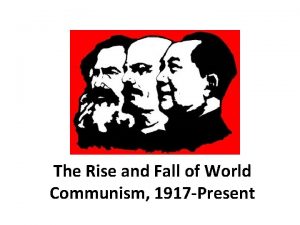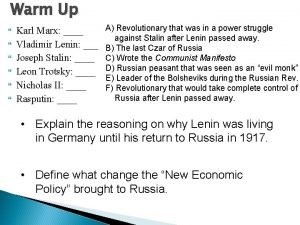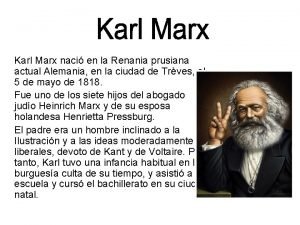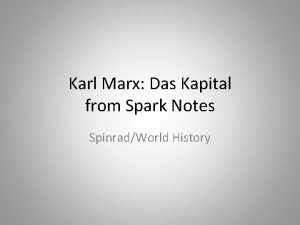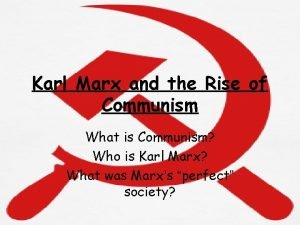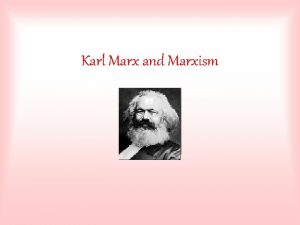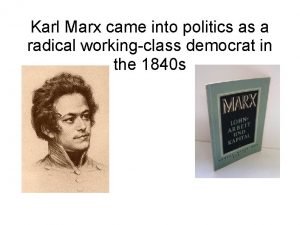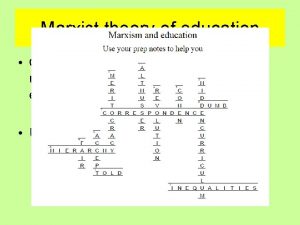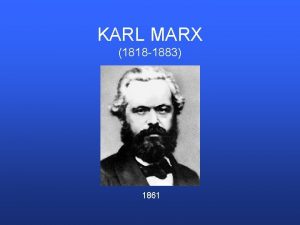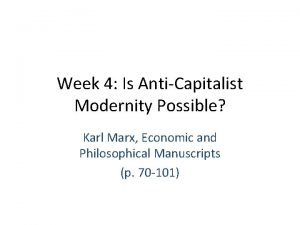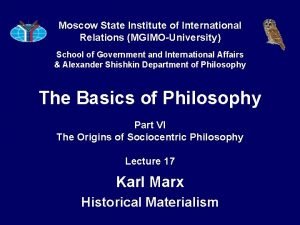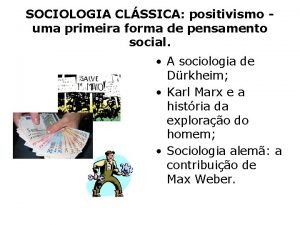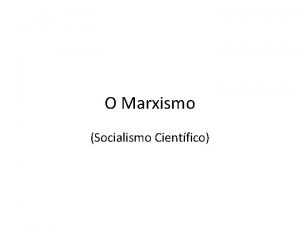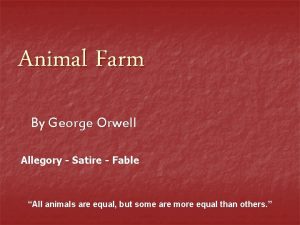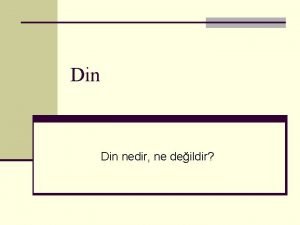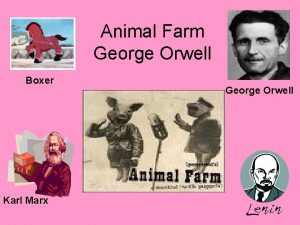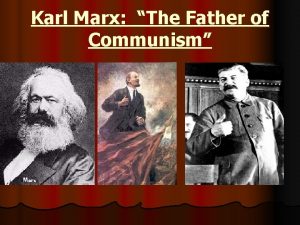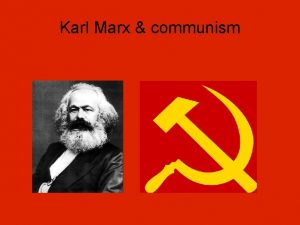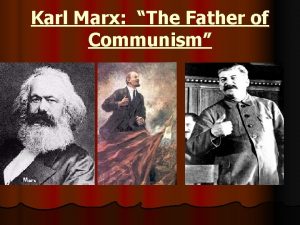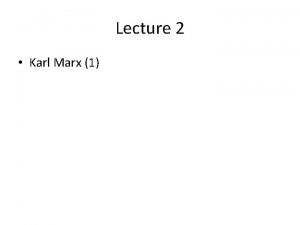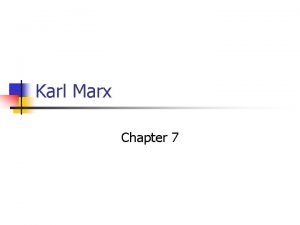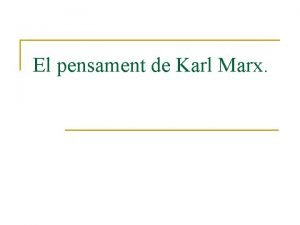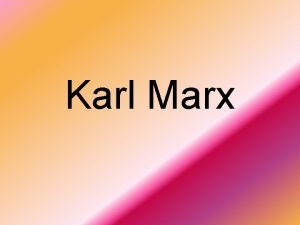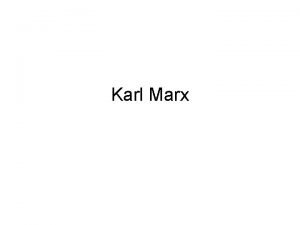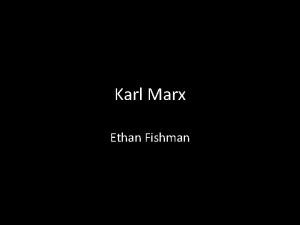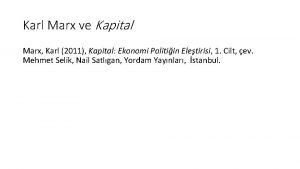Karl Marx The Father of Communism His Childhood


















- Slides: 18

Karl Marx: “The Father of Communism”

His Childhood Karl Marx was born on May 5 th 1818 in Trier, Germany. l He was raised in a middle class, working family. l His father, Hirschel, came from a long line of Jewish Rabbi’s. He converted to Catholicism early on in his life. l Marx was an unruly child, known for making his sisters eat mud pies. l

The College Years l l l His first year of college was at the University of Bonn, where he spent much of his time reading, drinking, and studying law. Afterwards, he transferred to the University of Berlin, where he discovered philosophy. This newly discovered passion for philosophy would alter the course of the rest of his life.

The Start of His Activism l l l After college, Marx sought out work in a German university, to no avail. His first job was as a journalist, for the Rheinische Zeitung (Rhineland Times). He was so effective, he was promoted to editor in one year, and was very popular with his subordinates. He encouraged articles that attacked the local Prussian authorities, as well as the liberal opposition for their ineffectiveness against the government. Due to the anti-government leanings of his paper, it was shut down by the authorities in 1843.

A Meeting of Like Minds In Paris, Marx got a job as the editor of the German French Yearbook. l It is here that he met a man that would grow into a lifelong friend associate, Friedrich Engels. l Engels was a revolutionary, much like Marx. However, he was a successful businessman and only practiced these ideals on the surface, without fully embracing them. l Out of all of the friends that Marx had in his life, Engels was the only one with whom he never argued. l

Origins of The Communist Manifesto Engels and Marx traveled to Brussels, to join the newly formed Communist League. l Due to their combined journalistic experience, the league tasked them with writing a manifesto. l Out of this arose Marx’s famous “Communist Manifesto” l

Purpose of the Communist Manifesto The Manifesto was a call to the working classes, to rise up and liberate themselves from the perceived chains of capitalism. l This would be achieved by replacing all private property with community property. l The manifesto established what the goals of the Communist league were, and what it was to become. l

The Key Manifesto Quote The Manifesto concludes with this important statement: l “Communists disdain to conceal their views and aims. They openly declare that their ends can be attained only by the forcible overthrow of all existing social conditions. Let the ruling classes tremble at a communist revolution. The proletariat have nothing to lose but their chains. They have a world to win. WORKERS OF THE WORLD, UNITE!” l

Socialism According to Marx l Karl Marx- German philosopher, supported the establishment of socialism and communism. l Wrote the “Manifesto of the Communist Party” along with Friedrich Engels. l Marx was unhappy with capitalism and the negative aspects of industrialization (Most significantly, the unfair exploitation of the working class.

Socialism According to Marx l He believed that a select few in society controlled most of the wealth and were taking advantage of the working class (Long hours, low pay, miserable working conditions, etc. ) l 2 classes emerged: 1. Bourgeoisie- Those who owned the means of production and were considered the wealthy class in a capitalist society

2 Classes cont. l Proletariat- Working classes or lower class in Capitalist society. l Originally derogatory in nature, Marx used the term to describe the working class.

What Needs To Take Place First? l Marx believed that history could be explained through class struggle l Marx was convinced that history would pass through certain phases (I. E. Feudalism, Capitalism, Socialism) until finally a Communist society would emerge.

Major Historical Events Feudalism: This picture shows serfs at work in the fields and Louis XVI being beheaded during French Revolution. Major events in history according To Marx

Basic Characteristics of Communism: l Collective ownership of land the means of production. l Classless society (Everyone is =====) l Everyone would work according to their abilities and… l Everyone receives according to their needs.

Communism Appears Easy, However… l Before it can take place, the working class (Proletariat) in the capitalist nation, must rise up and overthrow the minority who controlled the means of production (Bourgeoisie). l Marx refers to this as the “dictatorship of the proletariat. ”

Bolshevik Revolution https: //youtu. be/c. V 9 G 1 QUIm 7 w

Communism l After the proletariat has successfully overthrown the bourgeoisie: 1. Communism would gradually emerge. 2. The need for government would no longer exist. 3. There would no longer be separate classes in society.

History of Class Struggle
 Karl marx communism
Karl marx communism Karl marx vladimir lenin and joseph stalin
Karl marx vladimir lenin and joseph stalin Andres lazzerini muerte
Andres lazzerini muerte Alienação karl marx
Alienação karl marx Karl marx capital sparknotes
Karl marx capital sparknotes Utopia communism
Utopia communism Modo de produção segundo karl marx
Modo de produção segundo karl marx Conclusion of marxism
Conclusion of marxism Karl marx
Karl marx Karl marx system crossword
Karl marx system crossword Alienação karl marx
Alienação karl marx Karl marx
Karl marx Karl marx materialist conception of history
Karl marx materialist conception of history Positivismo
Positivismo Socialismo
Socialismo Infraestrutura karl marx
Infraestrutura karl marx Karl marx animal farm
Karl marx animal farm Din afyondur karl marx
Din afyondur karl marx Sugarcandy mountain animal farm
Sugarcandy mountain animal farm
